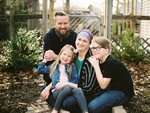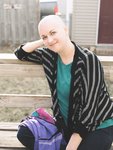

One of the menacing aspects of breast cancer is that it can develop, seemingly at random, with no warning.
That's what happened to Megan Boggs.
After an unencumbered 40 years of life, Boggs had a routine mammogram in January that showed something suspicious. Additional images and a biopsy confirmed invasive ductal carcinoma, the most common form of breast cancer. She had no family history of breast cancer and had never been concerned about the possibility of a positive diagnosis. Then Dr. Connie Novak, her family's physician who's also a breast cancer survivor, delivered the news.
“It came as quite a shock,” Boggs said. “I hadn't been vigilant about self-exams but never suspected a problem. After I knew about the tumor, in hindsight, I feel like I should have noticed it myself earlier.”
Tough days followed throughout her fight, but she found hope through her faith and love from those around her. She said the experience has given her the opportunity to see how truly loved her family is. And if there's a positive to come from the whole ordeal it's her new outlook.
“It has shifted my attitude from one of worry, anxiety, frustration and fear to one of thankfulness for all of the blessings we have received during this time,” she said. “It helped to be surrounded by my husband and kids who went above and beyond to make me smile and laugh and keep my attitude as upbeat as possible.”
She received meals, greeting cards, texts and screen-printed shirts her husband made to raise money for their compiling medical bills.
That support helped her through the difficult chemotherapy treatments. Before undergoing treatment her idea of chemotherapy was nausea and hair loss. She wasn't prepared for the fatigue, mouth sores, taste changes, muscle and bone pain, neuropathy, hot flashes, chills, constipation or heartburn, just to name of a few of the side effects she could remember.
She also found levity in losing her hair, allowing her husband and kids each an opportunity to cut and buzz off chunks. She said the memory of their laughter in those moments was something she'd treasure. Those fond memories served as a stark contrast from the tears and concern.
“I tried to remember that their worry, fear and sadness came from a place of love,” she said. “We were able to remind one another that the hard times wouldn't last forever and that we could still laugh and find joyful moments even through cancer.”
The world changed since her diagnosis in January. A pandemic made her treatments and appointments more isolating, she said, forcing her husband to drive to the cancer center and wait in the car during the three-hour infusions. They texted during those three hours to stay connected.
She said quarantine helped her family stay in their own “little bubble” so they didn't have to worry about potential exposure. For the first couple of months the only places she went were the cancer center and clinic.
Boggs underwent her final radiation treatment on Oct. 8. Immediately after she experienced a wave of mixed emotions. She felt joy and relief having made it through the ordeal, followed by the realization that her life still wouldn't return to the way it was before. She said she's not the same person now that she was before and, in some ways, that's a good thing.
“I was in fight mode for so long that now that it's over the rest of my emotions have come flooding in as I process everything our family went through,” she said.
She also credited Project Pink'd, which gave her a chemotherapy care bag and shared support, through her journey. Between them, her family and friends, she knew she was never alone throughout the past nine months.
Boggs emphasized the importance of self-exams and annual mammograms. She did a baseline mammogram at 38 at her doctor's recommendation and said she thought it was helpful to have as a comparison. Her experience gave her the opportunity to meet women in their 20s who also battled breast cancer, showing her that it can truly reach anyone.
She said her experience taught her not to be “wonder woman” or “super mom.” Yes, undergoing treatment takes courage and bravery, but granting grace and being self-forgiving was something she wanted to encourage to future breast cancer fighters. Allow others to help, she said.
“Listen to your body, give it time to heal and spend time in prayer,” she said. “It's so easy to get upset, angry and dwell on the hurt when faced with a cancer diagnosis. Allow yourself to feel those emotions, but then do your best to shift your perspective and find the joy.”